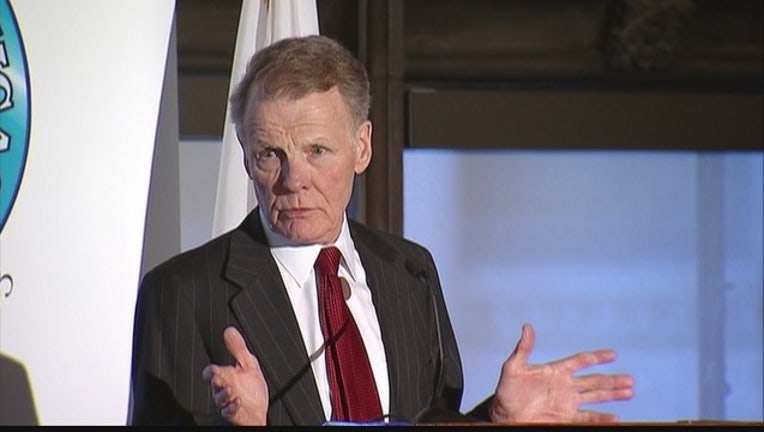Illinois House full of action but no budget choice debate

SPRINGFIELD, Ill. (AP) - Illinois House Democrats tried to digest some unpalatable budget choices Monday, chewing on a Senate proposal with $5 billion in new taxes and some questionable savings that some members think the taxes won't cover.
Leading Democrats wouldn't commit to a 32 percent personal income-tax rate increase, but they voiced doubts about some of the savings from spending reductions that are part of the $37.3 billion measure the Senate endorsed last week.
"We're looking at whether there are alternative revenues but also whether there are additional cuts," said Assistant Democratic Leader Jay Hoffman of Swansea. "Those are very difficult decisions."
The House Revenue Committee ended the day by advancing legislation that would increase the personal income tax rate from 3.75 percent to 4.95 percent and broaden the sales tax base to include a smattering of services, from dry cleaning to tattoos, with two days remaining in the spring session. Republican Rep. David McSweeney of Barrington Hills complained the tax hike would hurt small businesses and families.
"What do you think inaction is going to do?" asked the bill's sponsor, Rep. Will Davis, a Homewood Democrat.
Illinois, which hasn't had an annual budget since summer 2015, is running a deficit of as much as $6 billion and sitting on $14.5 billion in overdue bills. Senate Democrats approved a plan without Republican support that not only raises income and sales taxes, but reduces spending by $3 billion.
But those spending reductions include $1.25 billion in savings from a less-generous pension program for new employees and $450 million saved on state employee health insurance that relies on GOP Gov. Bruce Rauner reaching agreement on those changes. Hoffman also questions the amount of money expected to be collected from expanded casino gambling.
While little was said about the budget in public debate, the floor was rife with action as the House approved automatic voter registration, state purchasing improvements, a measure to protect immigrants who are in the country illegally from detention and deportation, and a tougher sentencing structure for repeat gun offenders.
Democrats continued their yearslong criticism of legislative Republicans and the governor. Deputy Majority Leader Lou Lang, a Skokie Democrat, suggested the General Assembly could approve a balanced budget if Rauner would "finally decide to enter the room like an adult and do the job he was elected to do."
Eleni Demertzis, spokeswoman for Rauner, said the governor's chief of staff has offered to meet individually with Majority Leader Barbara Flynn Currie of Chicago but that Currie has refused. Currie said she has told the governor's staff she wants to bring along other representatives assigned to the task of negotiating with the governor.
Demertzis did offer some credit to the House for one change Rauner seeks. The House endorsed streamlined state purchasing to guard against abuses but make it easier for vendors to sell their wares and services. The legislation by Democratic Rep. Al Riley of Olympia Fields is returning to the Senate for concurrence.
The "TRUST Act," which advocates say protects immigrants who are in the country illegally from federal harassment, was approved in the House 62-49. It prohibits federal officials from pursuing immigrants without a criminal warrant.
"These are people who live here, pay taxes here, and help us lift up the Illinois economy," Welch said of the measure, which goes back to the Senate.
Another automatic voter registration measure got a House OK after a similar measure last year was vetoed by Rauner over voter fraud concerns. The plan would automatically register eligible people when they visit the offices of one of several state agencies. Rep. Robyn Gable, an Evanston Democrat, said it would modernize the registration system and increase voter participation.
House Republican Leader Jim Durkin of Western Springs led passage on a 70-41 vote of legislation to stiffen penalties for repeat drug offenders to address Chicago violence. It includes a diversion program for young first-time offenders and reduces sentences for certain drug offenses.
___
The bills are SB8 , SB9 , SB31 , SB1722 and SB1933 .
___
Contact John O'Connor at https://www.twitter.com/apoconnor and Kiannah Sepeda-Miller at https://www.twitter.com/kiannahsepeda .

